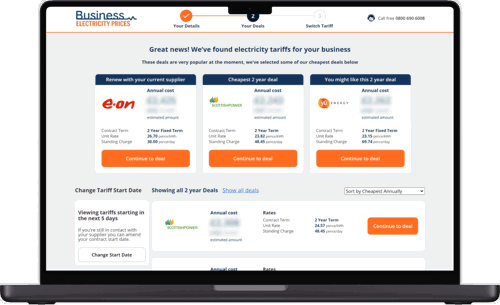Find the cheapest business electricity prices online.
Find a new dealDon't miss out on business electricity savings for your sector
Take back control of rising energy costs so your business can continue to grow
Easy online comparison
A range of live supplier deals
Switch online today!







Save on Business Electricity
Suppliers
-
 British Gas, the UK’s largest supplier
British Gas, the UK’s largest supplier -
 ScottishPower supplies gas & electricity to the UK
ScottishPower supplies gas & electricity to the UK -
 EDF, French-owned supplier leading in renewable electricity
EDF, French-owned supplier leading in renewable electricity -
 A dedicated supplier for large businesses
A dedicated supplier for large businesses -
 E.ON Next, a dedicated supplier for small businesses
E.ON Next, a dedicated supplier for small businesses -
 Smartest Energy, flexible tariffs to suit a variety of businesses
Smartest Energy, flexible tariffs to suit a variety of businesses -
 Valda Energy supplies energy to business across the UK
Valda Energy supplies energy to business across the UK
At Business Electricity Prices, we understand that each business has different electricity requirements. No matter what type of business you run, our experts can help with a great tariff that meets your needs.
Whether you’re a large manufacturing firm or a small non-profit organisation, there are real savings to be found by comparing electricity prices. When you compare with Business Electricity Prices, you can benefit from tailored advice on how to reduce your electricity consumption and further lower your bills.
To help you get the most from your business gas and business electricity contract, we’ve put together specialist switching advice for a wide range of business sectors.
Education
With the average UK secondary spending around £90,000 per year on electricity, schools and education centres need to ensure they don’t overpay for their bills.
Places of worship
Meeting electricity costs for places of worship can be expensive, especially when buildings are older with a lack of insulation. Get advice on how to reduce your electricity costs with Business Electricity Prices.
Charities
With charities often still treated like small businesses when it comes to comparing electricity, you must be aware of your rights. Find out how you can pay reduced VAT rates on your electricity bills.
Enterprise and Corporate
Enterprise and corporate customers - or else mid market customers - have energy needs that are more specialised than SME customers. Our team of energy experts are able to assist businesses in this segment to save money on their commercial electricity and commercial gas costs.
Compare business electricity rates
Save money on your electricity bills.